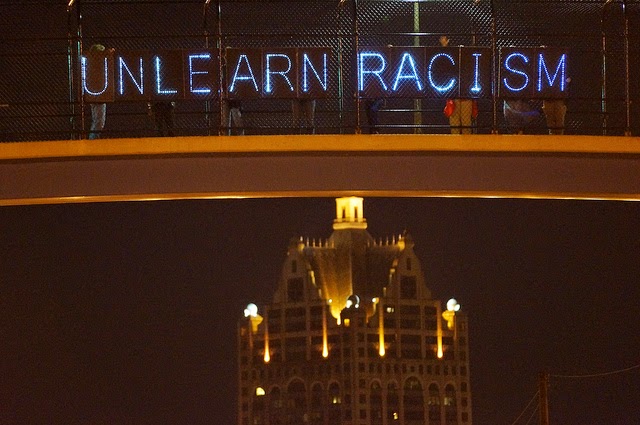Flickr.com
In
the film, “Race: The Power of an Illusion, Episode 1,” microbiologist Pilar
Ossorio stated that the genetic variation between people of the same racial
group are greater than that of different racial groups. Before the experiment was conducted, many
students imagined that they were going to be
the same biologically as the person they considered as part of the same race. As I suspected, the students were not correct
and were stunned to see the results. They discovered that not only were they unique within racial groups but also that their DNA was similar to other people
that were across the globe.
While watching the film, I
noticed that each student automatically knew who he or she was. Some knew they
were white, and others considered themselves black. As for me, my parents
always told me I was Mexican. I always followed Mexican tradition, including
holidays, and my parents made sure I learned their language first. After some
time, I changed from being entirely Mexican to now Mexican-American, although
it is not an option on any application that I have seen that requires ethnicity.
In Madera, where I currently reside, to be Mexican has a negative connotation.
Since I classify myself as Mexican and because to most I look Mexican, there is
always a lot to prove with my identity. People always assume Mexicans will not
get far in education and they will either work in the fields or accept welfare
for the rest of their life. Since race does exist and since people create
stereotypes, being Mexican motivates me to prove everyone else otherwise and to
eventually see myself as successful.
listening to what the
film said about Race, it made me realize how many people are misinformed on
what they believe race is, myself included. What is most interesting is that race isn’t a single
definition but instead on how each person was raised to believe what it is.
Like for example, what might be considered white to Americans might not be
considered white to Mexicans. It all depends on the majority. About four months
ago I was hired by Sal’s Mexican Restaurant. I noticed that everyone around me
always spoke to me in English, even people that hardly knew how to speak it. I
knew they suspected I was white because of how unbelievably “white” my skin is
to be considered Mexican. After speaking Spanish to a customer everyone was
shocked and confronted me about it. That incident proved my theory right, that
everyone has his or her own definition of race. Even though I am against having
classifying people, I still catch myself believing some of the stereotypes/race
that people create and spread. Until we stop seeing and focusing on who belongs
where, then will the whole idea of race start to minimize. I still consider
myself Mexican because of how use to it I am, if I didn’t have a label to my
identity it would make me feel awkward and out of place. Hopefully one day in
the near future race will no longer exist and the problems that already exist
because of race will start to slowly decrease.
Even though
scientists haven’t discovered any genetic based difference between “races”, I
am certain this idea will continue to exist. Within the years it is no doubt
that “whites” have benefited from classifying people based off what race they
are. They were seen as the superior, white, educated, rich, business owning
type of people who were above any other race in America. I believe it is still
around because of a tradition we have as Americans. We got so use to
classifying one another that it would be odd to have a world without racial
identities. Who we are as a race does shape us whether we know it or not it.
Like mentioned earlier, to be Mexican motivated me to do better in life and to
prove people in my city wrong about their stereotypes. In my perspective, the
people who presently benefit socially are the people who have a good education
and or a successful life. One thing is for sure, if race does get eliminated
one day, I know it will reduce problems around us; discrimination included.



